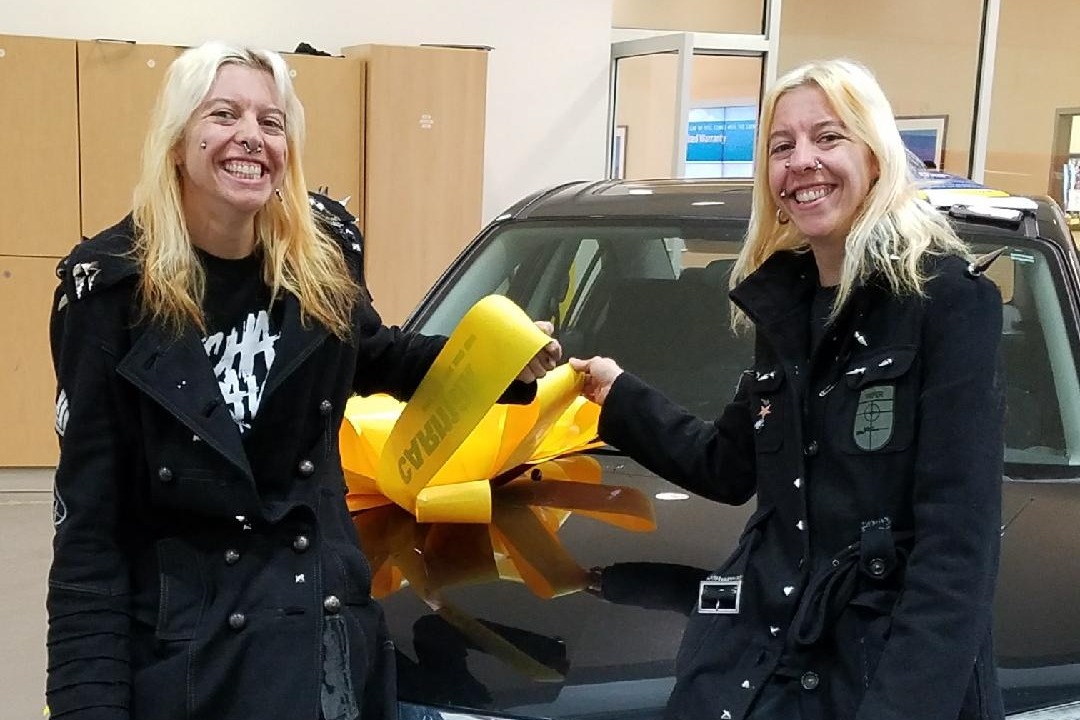For anyone who knew Sara and Amanda Eldritch, they could be described as amazing women with big hearts.

The 33-year-old twins from Colorado were found dead last week in what officials are calling a possible “suicide pact,” according to the Colorado Springs Gazette. The sisters were found dead in a parked vehicle with gunshot wounds, the Fremont County Sheriff’s Office told Canon City News earlier this week.
The sisters battled with severe obsessive-compulsive disorder (OCD), which sometimes forced them to take 10-hour showers and eventually cut off other social aspects of their lives. In 2017, they appeared on The Doctors, after being the first patients to undergo a groundbreaking surgery to stimulate the brain.
On Tuesday, the hospital that took care of their sisters after their surgery released a statement on Facebook with their condolences.
“Our hearts are heavy with the passing of Sara and Amanda Eldritch. Our Littleton Adventist Hospital team first met the sisters more than three years ago when they had a minimally invasive surgical procedure called deep brain stimulation to help treat their debilitating obsessive compulsive disorder. Sara and Amanda were courageous, inspiring women who shared their story, even when difficult to do so, in hopes it might help others. Our prayers and thoughts are with their family and friends.”
READ MORE: How painting helped a New Brunswick family deal with a mental health crisis
Understanding the disorder
According to a GoFundMe page set up for the sisters’ mother Kathy Worland, the twins were doing better after the procedure. “Their progress after the surgery surpassed all expectations and they packed an entire lifetime into the last three years. But, there is no cure for mental illness, and they finally succumbed to this insidious disease,” the page notes.

Get weekly health news
“While they will be missed so very much, Sara and Amanda will live on in the hearts and memories of everyone they left behind.”
The sisters are described as creative, intelligent and compassionate, and enjoyed spending time with their three dogs. “Sara and Amanda had an impact on everyone they met, and touched more people than they could have ever realized,” the account notes.
In 2016, the twins spoke with NBC affiliate 9 News about their disorders, adding they had an obsession over germs and contamination, and would continuously clean their homes and themselves.
“We had a serious rubbing alcohol problem,” Sara told the broadcaster. “We could go through five bottles a day, each, and that was on our skin.”

“There was one point when we were using so much hydrogen peroxide on our faces that it turned our eyebrows orange,” Amanda continued.
The sisters often wore gloves and cooked for themselves to avoid contamination. And while this debilitating form of OCD is one end of the illness, expert Rick Silver says there are more than 20 types.
The executive director of non-profit organization OCD Canada tells Global News types of OCD can range from constant checking, counting, cleaning or hoarding.
In the most severe cases, like that of the Eldritch twins, he adds, people aren’t able to leave their homes or their bedrooms because of their illness. Silver also acts as a cognitive behavioural therapist for people with OCD and says he often gets asked for a cure.
READ MORE: After losing sister to suicide, Sask. siblings work to lift stigma of mental illness
What is OCD?
The International OCD Foundation notes OCD can affect people of all ages, and when it does, people are often stuck in obsessive cycles or routines.
“Obsessions are unwanted, intrusive thoughts, images or urges that trigger intensely distressing feelings. Compulsions are behaviours an individual engages in to attempt to get rid of the obsessions and/or decrease his or her distress,” the foundation adds.
Other common obsessions can include sexual thoughts, religious obsessions or even perfectionism.
READ MORE: ‘Emotionally draining’ — The effect depression has on tasks like brushing hair, showering
And while Silver understands most people tend to “feel” like they have OCD in certain situations, it is not the same as someone who is living with the illness.
He says the other ongoing issue about living and talking about OCD is how it is portrayed in pop culture or shows. Obsessive reality series, like Hoarders, can exploit people with OCD, and the term “OCD” is also used freely. He argues people are now more understanding about depression and anxiety, but OCD is still not taken seriously and is often used an excuse or joke.
People throw around phrases like “I’m so OCD,” he adds, without knowing if they could be offending or hurting someone who actually lives with the illness.
“For people who have OCD and hear this, it hurts.”
Where to get help
If you or someone you know is in crisis and needs help, resources are available. In case of an emergency, please call 911 for immediate help.
The Canadian Association for Suicide Prevention, Depression Hurts and Kids Help Phone 1-800-668-6868 all offer ways of getting help if you, or someone you know, may be suffering from mental health issues.








Comments
Want to discuss? Please read our Commenting Policy first.